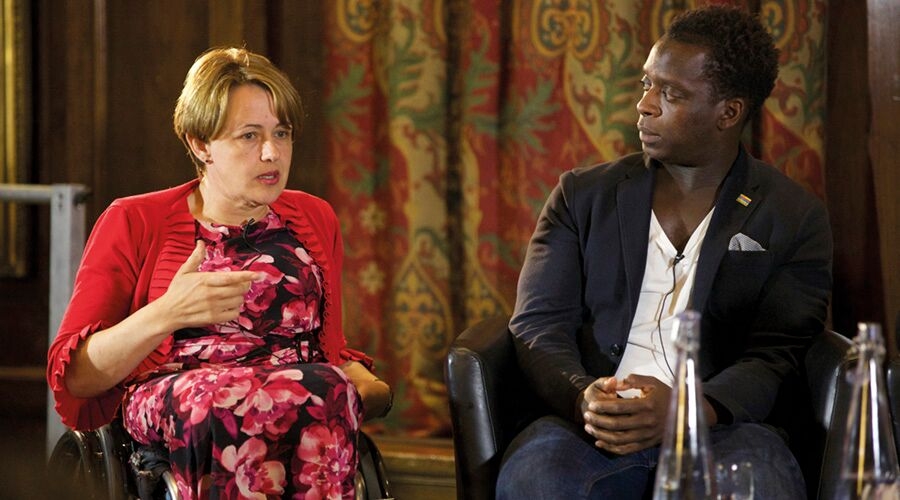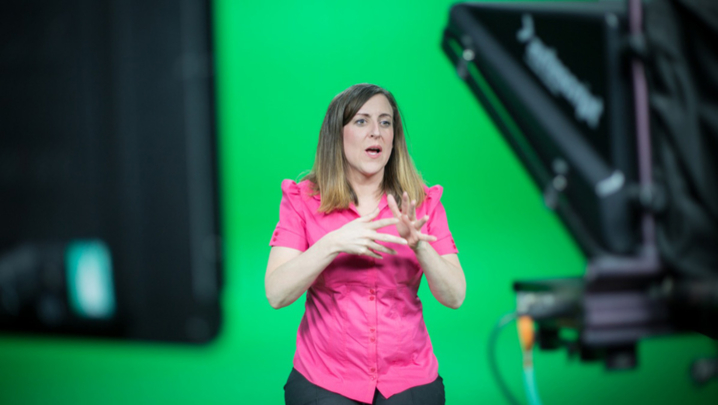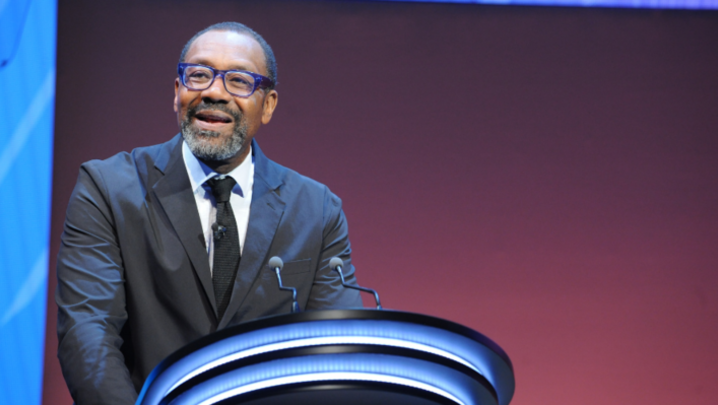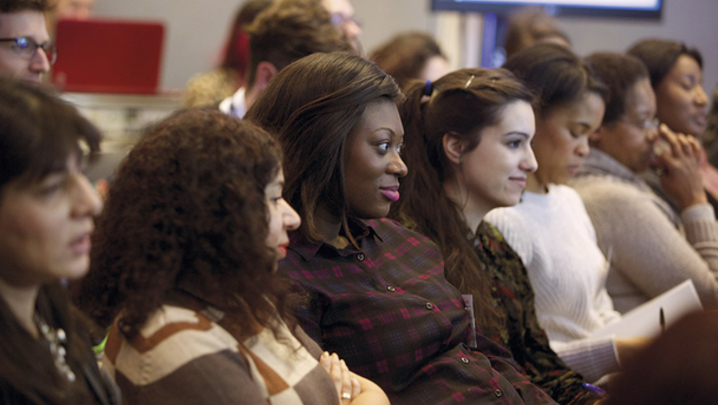A highly charged RTS event asked whether broadcasters’ plans to address diversity are delivering real change. Steve Clarke found the jury is still out
All TV industry watchers know that, thanks largely to Lenny Henry, diversity remains high on television’s agenda. In the past year or so, the BBC, Channel 4 and Sky have each made big announcements, pledging to improve their on-screen representation of minorities and to do more to nurture and encourage multi-ethnic and diverse workforces.
But has genuine change finally kicked in? That was the question that Sky News reporter Afua Hirsch wanted answering as she chaired a packed and often emotional RTS event provocatively entitled "Diversity: job done?".
As she repeatedly put some of the main protagonists on the spot and listened to members of the audience at the sharp end of the diversity debate, it emerged that, while progress is being made, more still needs to be done.
For good reason, the debate has focused on the lack of opportunities in TV for those from a black, Asian and minority ethnic (BAME) background, rather than those who are disabled.
Attendees heard from panellist and Paralympian Baroness Tanni Grey-Thompson, together with executives from the BBC, Channel 4 and Sky. Also on board was actor Kobna Holdbrook-Smith, a campaigner for Act for Change, which was set up in 2014.
The broadcasters, especially Sky and Channel 4, were keen to publicise their latest diversity initiatives. They claimed these were already making an impact.
But, as Grey-Thompson stressed at the beginning of the debate, unless the BBC got its act together on diversity, the entire TV community was in trouble.
Many in the room believed that the corporation’s diversity plan lacked clarity, was underfunded and too tardy.
A year ago, Grey-Thompson was appointed by the BBC to its newly formed Independent Diversity Advisory Group. This was part of Director-General Tony Hall’s drive to improve BAME representation on both sides of the camera.
This involved a £2.1m Creative Diversity Talent Fund to support "the development of ideas across all genres"; BAME writers, talent and production staff would be encouraged to get involved, promised the BBC.
Grey-Thompson, however, wondered if the speed of change at the corporation was fast enough.
"We need to do things much quicker than we have done in the past and the BBC should be leading the way," she said. "If the BBC is not doing it, it gives every other organisation an excuse not to do it, as well."
Grey-Thompson spoke movingly and angrily of her own experience of being discriminated against and how the media can impact on public perceptions of disabled people.
Disabled people are either portrayed as fun-loving Paralympians or benefits scroungers
"If you don’t see disabled people on screen, if you don’t see them in all walks of life, it is never going to change.
"I got disabled at seven, I am 45 now. Disabled people were locked away from society in care homes. They weren’t allowed out....
"Growing up, the only representation on TV was Sandy Richardson in Crossroads, where they didn’t want his chair on TV too much.
"It has got immeasurably better, but it is not as good as it needs to be."
Her sense of frustration was clear as she recalled how the 2012 Paralympics showed her that, when people were determined, attitudes could change suddenly.
"I’m slightly bored of people saying, ‘Let’s increase numbers in 20 years’ time and write another consultation’.... In 2012, we were able to say: ‘This is not good enough.’"
Hirsch asked if she felt the BBC’s Independent Diversity Advisory Group was independent enough. Yes, she replied: "I feel there are lots of people I am able to talk to at the BBC if there is ever an issue..."
Turning to Tunde Ogungbesan, the BBC’s Head of HR for Diversity, Inclusion and Succession, the Sky News journalist wanted to know if the BBC’s £2.1m BAME fund was sufficient to make a difference. And was it an annual commitment?
He said he understood it was and that accessing it "was the same as for any other commission". The Sky News Social Affairs and Education Editor pointed out that the fund amounted to only 0.1% of the licence fee.
Would Ogungbesan like to see it increased? "From what I understand, it is not the only amount of money that relates to diversity," he replied. "It is not only £2.1m, it is actually a lot more than that."
Pressed on how much other money was available to back diversity in programme budgets, the new BBC executive was unable to provide an answer.
Channel 4 announced its so-called 360° Diversity Charter in January. Ade Rawcliffe, the broadcaster’s Creative Diversity Manager, told the audience that the initiative was "a game changer".
She said: "Every production has to go through a diversity tick-box process for on-and off-screen.
"It means that diversity is the first conversation that people have... What’s been a pleasant surprise for us is how the independent sector has embraced it.... In the past, people have felt really passionate about diversity but haven’t had clear guidance about what to do. We now have clear guidelines."
How many current Channel 4 shows would pass the two-tick system? "Most of the programmes that have been commissioned since January are definitely two ticks. There have been exceptions," replied Rawcliffe.
If a production company had a black or minority ethnic accountant, would that count as one of the two ticks? "An accountant wouldn’t hit that."
Sky’s Head of Comedy, Lucy Lumsden, was equally upbeat about Sky’s diversity scheme. The aim was to have a minimum of 20% of the stars and writers of its UK-originated shows from a black, Asian or other minority ethnic background by the end of the year.
She said: "Diversity is very much on our watch to make a difference and make it happen.
"Stuart [Murphy, Sky’s Director, Entertainment Channels] didn’t take long to come up with these [quotas]. It is part of the passion and pioneering spirit of Stuart and Sky."
Sky wanted the terms of its diversity package – which also covers those working behind the screen – to be as clear as possible.
"I’ve been in the industry for 20 years. There has been such a change in the conversation this year," said Lumsden, who was formerly at the BBC. "Producers bring up the subject before we have to guilt them into it... the fabric of the conversation has shifted."
She cautioned: "I’m not saying job done, I’m really not... Basically, it’s a commercial advantage for Sky. If you’re pitching a show to Sky and you haven’t met our targets and you don’t believe in them, you are not going to get your show away."
Actor Kobna Holdbrook-Smith expressed reservations over what the TV executives had told the RTS. "What I’ve heard in the year and a half that we’ve been working is very exciting, but what I’ve also heard is many people say that they’ve been here before, time and time again.
"That’s a worry. We can’t do anything until we’ve seen more results.
"What I want to see next are mechanisms for transparency. We need to monitor ourselves and not just betold what is happening. We need to have the ability to go online and see it for ourselves."
Subsequently, speaking from the floor, John McVay, CEO of Pact and Chair of the Creative Diversity Network, claimed that the new monitoring system, Diamond, would ensure that "there is nowhere to hide for broadcasters or indies. Diamond, which comes on stream later this year, covers all aspects of diversity, not just BAME. It is funded by broadcasters."
One apparent obstacle to implementing diversity schemes is the Equality Act. Hirsch enquired if this had been a problem for the schemes announced recently.
"We’ve been around this subject so long and, because of being caught up in the legalities of it, it has been crippling to make change happen as quickly as we’d like," acknowledged Lumsden.
"Around disabled people, we’ve got some massive challenges.
"At the moment, disabled people are either portrayed as fun-loving Paralympians or benefits scroungers sucking money off the state... pretending to be disabled when they’re not. Or they are portrayed as victims.
"The reality is that we don’t fit into boxes or Venn diagrams."
Turning to the issue of punishing those who fail to meet diversity targets – Channel 4’s solution is to cut bonuses – Hirsch asked what sanctions the BBC had.
"Unfortunately, we don’t get bonuses at the BBC, so we have to find other ways of bringing sanctions," replied Ogungbesan. "We can celebrate success: where indies and in-house producers are doing the right things, we celebrate that success.
"Where it is not happening, it is noted. The word is getting out there and they probably won’t get another commission."
Holdbrook-Smith repeated his scepticism: "I am excited about it, but, until I see the results on screen, on sets and in offices, it’s the same thing that we’ve heard.
"I don’t want to be negative about it, but a part of me still feels a little guarded.
"The tendency is for these initiatives to be announced, they roll out and then, after a few years, they seem to have evaporated."
Both Lumsden and Ogungbesan stressed the business case for having content and a workforce that reflects modern Britain.
In order to attract new customers, Sky needed to mirror the population as a whole, suggested Lumsden.
Over the years, consultants had demonstrated that companies employing people from diverse backgrounds were more likely to succeed financially, noted the BBC man.
He added: "The more diverse you are, the more creative and innovative you will be."
Hirsch wanted to know if Channel 4 was addressing diversity in the craft skills area. "There are gaps in the industry," admitted Rawcliffe. "If I look at our industry, diversity guidelines for crewing is a challenge. Our scripted commissioners tell me that."
"If people are struggling to find a crew, we would love a conversation about it. If it’s impossible on this show, make sure it’s possible on the next one," recommended Lumsden.
"We have funds sitting there, if it is hard to find someone from outside your immediate talent pool. They might have to travel and add cost to the budget. Talk to us. If there is a sensible business case, I will top up funding.
"I am not sure everyone is aware of that. People are not coming forward.... This is a tricky year. There’s been a squeeze on the talent pool."
Broadcasters and producers needed to do more to tell young people of the opportunities that exist in the craft sector, the panellists agreed.
Lumsden said that the recent RTS Student Television Awards once again illustrated the lack of diversity among young wannabes.
She said: "It was a brilliant event, but it was weird how it was very white. I found it odd that the nationwide student awards were so white."
Fostering a diverse TV community won’t happen overnight, but change is beginning to work its way through. As Simon Albury, Chair of the Campaign for Broadcasting Equality, said: "Money drives change."
It can’t, however, be only about money. "It’s also got to be about shifting attitudes...," stressed Grey-Thompson. "You do need an amount that is ring-fenced [see below] but if it is only that.... You’ve got to be much smarter about how you use budgets.... If you were going to ring-fence an amount, it would probably have to be £100m."
‘Diversity: job done?’ was an RTS early-evening event held at One George Street, London, on 22 June. The producer was Angela Ferreira of Joy Media.
What is the BBC’s diversity fund for?
Marcus Ryder, Head of Current Affairs, BBC Scotland: ‘You could have an all-white production company and the show could be written by a white person, but if Tanni presented it, it would still be eligible [for diversity funding], despite having nothing to do with disability....
‘It’s brilliant that we’ve been told today that the £2.1m is annual. It’s the first time anybody from the BBC has answered that question directly....
‘If we can have it in writing, that would be wonderful, too.’ Tunde Ogungbesan: ‘I will go back and see if that’s possible.’
Marcus Ryder: ‘What would failure look like to you?’
Tunde Ogungbesan: ‘Not hitting our targets in terms of the numbers of people or the percentages we’ve said we want to put in place by 2017.’
When is a chat an interview?
Treise O’Brien, freelance producer: [speaking from the floor] ‘One of the things I’ve always found problematic is seeing jobs advertised and applying for them.
‘They’re fully advertised on the main broadcasters’ websites. You apply and you’re invited in for a chat. They’re thoroughly unfair. They are unmonitored.
‘Often, you don’t hear anything back or you are asked inappropriate questions. The chats are all under the radar. That is a very big problem when you’re trying to recruit people, especially BAMEs.’
Ade Rawcliffe: ‘When you’re working in TV, there is no such thing as a chat. When they invite you for a chat, prepare for an interview. ‘As an industry, we have to be more professional about how we recruit.’
Judith Lee, sound recordist: [speaking from the floor] ‘I’ve been in the industry for 30 years. I’ve experienced interviews where the questions asked have nothing to do with sound.
‘My race, the colour of my ears doesn’t matter. It is whether I can do my job.
‘I still come up against, "Oh, well, we’ve never worked with a black woman before, so we’re not sure if we can work with you".’
Don’t hire people like yourself
Kobna Holdbrook-Smith: ‘Reach outwards, rather than stand still with open arms. If not, the people who come to you will always be the same....
‘Thinking about diversity is as much about adapting what you think you know to someone else, as bringing someone who is different into your existing organisation and adapting them. That is basically saying, "Come and be me".’
Tunde Ogungbesan: ‘You need to ensure that job panels are diverse and are prepared to take a risk. ‘By that, I mean: think seriously about [recruiting] someone who doesn’t look like yourself.’





